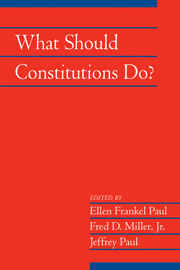Book contents
- Frontmatter
- Contents
- Introduction
- Acknowledgments
- Contributors
- What Are Constitutions, and What Should (and Can) They Do?
- Constitution and Fundamental Law: The Lesson of Classical Athens
- Contract, Covenant, Constitution
- Constitutionalism in the Age of Terror
- The Liberal Constitution and Foreign Affairs
- Do Constitutions Have a Point? Reflections on “Parchment Barriers” and Preambles
- The Origins of an Independent Judiciary in New York, 1621-1777
- Foot Voting, Political Ignorance, and Constitutional Design
- Pluralist Constitutionalism
- Deliberative Democracy and Constitutions
- The Constitution of Nondomination
- Can We Design an Optimal Constitution? Of Structural Ambiguity and Rights Clarity
- Index
The Liberal Constitution and Foreign Affairs
Published online by Cambridge University Press: 05 June 2012
- Frontmatter
- Contents
- Introduction
- Acknowledgments
- Contributors
- What Are Constitutions, and What Should (and Can) They Do?
- Constitution and Fundamental Law: The Lesson of Classical Athens
- Contract, Covenant, Constitution
- Constitutionalism in the Age of Terror
- The Liberal Constitution and Foreign Affairs
- Do Constitutions Have a Point? Reflections on “Parchment Barriers” and Preambles
- The Origins of an Independent Judiciary in New York, 1621-1777
- Foot Voting, Political Ignorance, and Constitutional Design
- Pluralist Constitutionalism
- Deliberative Democracy and Constitutions
- The Constitution of Nondomination
- Can We Design an Optimal Constitution? Of Structural Ambiguity and Rights Clarity
- Index
Summary
INTRODUCTION
The law of foreign relations as a constitutional discipline in the United States has grown considerably in recent years. While people have debated the meaning of the American Constitution's foreign-relations clauses since the beginning of the Republic, in recent years scholars, judges, and politicians have increasingly clashed over what the Constitution says. The acrimonious contenders are the internationalists and the exceptionalists. Internationalists would like to see the Constitution adapt to the evolving strictures of international law and politics. They generally favor three policies: a robust incorporation of international norms into the American constitutional system; more congressional and judicial control of the president's conduct of foreign policy; and a limited role for federalism and the states in international affairs. Exceptionalists claim either that the original understanding of the U.S. Constitution does not sit well with the internationalist view, or that the United States should follow its own course free of most international constraints, or both. To them, international norms may not be entirely compatible with the Constitution or the values and interests of the United States. According to exceptionalists, constitutional interpretation should reflect those differences. They generally favor policies that are the opposite of those favored by internationalists: limited foreign influence on the American constitutional system; a strong role for the executive in the conduct of foreign policy and a correspondingly limited role for Congress and the courts; and a revival of principles of federalism in foreign affairs.
- Type
- Chapter
- Information
- What Should Constitutions Do? , pp. 115 - 149Publisher: Cambridge University PressPrint publication year: 2011



